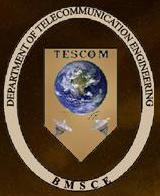| Course Information | ||
| Class | Session | Download |
| IV Semester | Course Information [429 KB] | |
| VI Semester | Course Information [131 KB] | |
| VIII Semester | Course Information [89 KB] | |
Saturday, February 9, 2008
Course Information(Syllabus) for fourth,sixth and eight semester.
Syllabus,question paers,lecture notes, Lab Manuals,Lab Support for all semesters.
Syllabus notes and question papers for Telecom all semesters
| Learning Resource | |
| Subject | Download |
| 2nd Semester | |
| Basic Electronics |
|
| 3rd Semester | |
| Analog Electronics |
|
| Electrical Conductivity | Course Material [634 KB] |
| Electronic Instrumentation |
|
| Engineering Maths - 3 | Test 1 Solution [73 KB] |
| Field Theory |
|
| Logic Design | Download [10.5 MB] |
| Network Analysis |
|
| 4th Semester | |
| 8085 | Course Material [5.17 MB] |
| Computer Organisation | Course Material [6.45 MB] |
| Field Theory |
|
| ICs & Applications | Course Description [6 KB] |
| 5th Semester | |
| Advanced Microprocessor | Test 2 [193 KB] |
| Analog Communication |
|
| Solid State Devices | |
| Telecom Switching |
|
| Transmission Lines Wavegides | |
| 6th Semester | |
| Antenna Propogation | Course Material [1.38 MB] |
| Microcontroller Application | Course Material [151 KB] |
| VHDL | Course Material [23.1 MB] |
| Microwave Engg. Lab viva questions | Lecture notes [29 KB] |
| 7th Semester | |
| Satellite Communication |
|
| Computer Communication Networks |
|
| Data Structure C++ |
|
| 8th Semester | |
| Embedded Systems & Design | Course Material [7.65MB] |
| High Performance Communication Networks | Course Material [157KB] |
| Optical Fiber Communication |
|
Monday, September 17, 2007
AVAYA: internship recruitment.
Tuesday, September 4, 2007
Syllabus for 3rd, 5th and 7th semester.
| Course Information | ||
| Class | Session | Download |
| III Semester | Aug 2007 - Dec 2007 |
|
| V Semester | Aug 2007 - Dec 2007 |
|
| VII Semester | Aug 2007 - Dec 2007 |
|
Monday, August 27, 2007
Syllabus of 5th Semester.
Saturday, August 25, 2007
MS In Telecommunications
Hi. I am Dr. Lefebvre, Assistant Professor and Department Chair at the SUNY Institute of Technology Telecommunication Department. I would like to invite you to
looked at the State University of New York Institute of Technology's Telecommunication Networking Department as a possible place to obtain your MS degree. We have a strong program in Wireless and Wired Networks, Information Assurance, Optical Networks, Telecommunication Management and Protocols. We have been very successful at placing our graduates in high paying positions at both large and small companies (over 90% placement rate). In addition, several of our graduates have moved onto other colleges/universitites to obtain their Ph.D. There are scholarships and assistantships available for the spring and fall semesters. We require around 213 for TOEFL and are flexible on the GRE. I would be glad to discuss our program with you further, just email me at lefebvk@sunyit.edu. Also, in 2002 our Telecommunication Department was ranked #1 by the Peterson's guide.
Our website: Under reconstruction
http://clubs.sunyit.edu/telecom
General website: www.sunyit.edu
Application website: http://web2.sunyit.edu/catalogs/graduat
Dr. Lefebvre
Assistant Professor
Department Chair
Telecommunication Department
SUNY Institute of Technology
Friday, July 20, 2007
Email on tcebatch05 on yahoo groups
Recently I got a mail on my inbox from the yahoo group of our batch name tcebatch05 and i found it funny enough to share with you people. Give it a reading and pour in your comments::
Dear Comrades,
Hope everyone has done well in your 4th semester exams, if
not,then lets
hope that all the lecturers' curses are not working...We have had
enough fun
in class, irritating each and every lecturer we have encountered in
our
engineering course(with a few exceptions like PMS, he deserved it!).Our
class has surely developed a huge reputation of being the WORST CLASS in
college... Even the best teachers in college could not handle our class...
Believe me, they were cursing us in front of the other department
students...The
after-effects of the curse is showing... Most of us would get
very low marks in
the externals, we would have the worst lecturers in
college to teach us, this
will make us get lower marks and that would bring
teachers who are even worse
and the cycle would keep repeating till we will
become losers.I might have
exaggerated a lot, but i am very sure that we
will end up as losers if we
continue what we are doing now.Hope the message
has been conveyed to everyone.
Lets become more serious in academics and get
our lost respects back!
I don know wha guilty consience is the author of this mail suffering from but he needs a little of our counselling i guess!!



